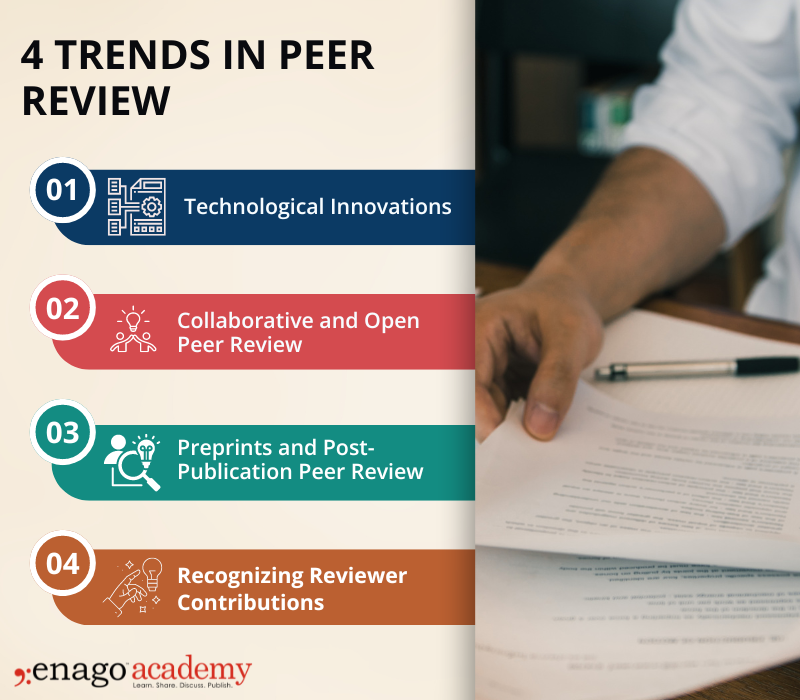Peer Review 2024: Trends shaping the future of peer review

Understanding the evolving landscape of the peer review process is crucial for reviewers, publishers, and policymakers to stay abreast of the developments and improve the overall robustness of the process. As we are set to commemorate the Peer Review Week 2024, analyzing the latest trends that has reshaped the traditional peer review process can mark the beginning toward revolutionizing the future of publishing.
Key Trends Shaping Peer Review
 1. Technological Innovations
1. Technological Innovations
Advancements in technology and AI has significantly transformed the peer review landscape. One of the most notable innovations is the introduction of AI-powered peer review assistants. From automating initial manuscript assessments to identifying potential data or image fraud, these technologies promise to save reviewer’s time and expedite the review process.
Additionally, tools like Enago Read can strongly assist reviewers by allowing them interact with the manuscript through copilot, search related references, and identify research gaps in less time. Moreover, these technologies can provide a preliminary structured peer review report to establish consistency and thoroughness to reviewer feedback.
2. Collaborative and Open Peer Review
The traditional peer review system, often criticized for its opacity and potential inclusion of biases, is being reimagined through collaborative and open peer review models. Collaborative peer review, where multiple reviewers work together to assess a manuscript, is gaining traction as it mitigates the risk of individual biases and uses collective expertise to improve the review quality. Although collaborative review may lead to more thorough and thoughtful reviews; it can also increase the time commitment and could influence individual reviewer’s opinions. As a result, collaborative peer review should be an option rather than a new standard.
Simultaneously, open peer review is becoming increasingly popular. This model, which makes reviewer identities and comments public, promotes greater accountability in the review process and enhances transparency in scientific discourse.
3. Preprints and Post-Publication Peer Review
The growth of preprint servers has revolutionized how research is disseminated and evaluated. Preprints allow researchers to share findings rapidly, receive early feedback from the scientific community, and establish priority for discoveries. Alongside preprints, post-publication peer review is gaining momentum. This approach enables continuous evaluation of published work and contributes to the ongoing scientific discourse beyond initial publication.
4. Recognizing Reviewer Contributions
The often-overlooked contributions of peer reviewers are finally gaining recognition. Journals and institutions are increasingly implementing systems to acknowledge the efforts of reviewers, whether through formal recognition, reviewer credits, or even financial incentives. Recognition initiatives include issuing DOIs for peer review reports, implementing reviewer recognition platforms, and providing tangible credit for reviewer contributions. This shift not only motivates reviewers but also highlights the importance of their role in maintaining the quality of scholarly publications.
Efforts are also underway to make the peer review process more equitable. Initiatives aimed at diversifying reviewer pools and ensuring that underrepresented groups have a voice in the review process are essential steps toward creating a more inclusive academic community.
As we continue to witness these transformative changes in peer review, staying informed and adaptable will be key for all stakeholders in the academic publishing ecosystem. The future of peer review is collaborative, transparent, and technologically enhanced – are you ready to be a part of this revolution?









